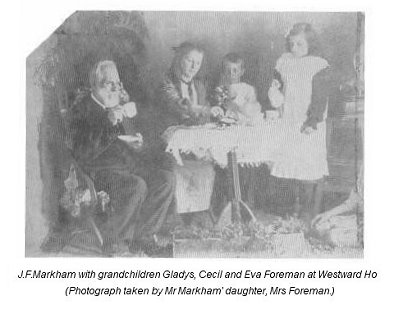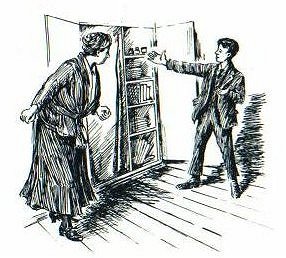Consideration was given to removing the School from any denominational
control, as although it belonged to the Mission practically the whole expense
fell on the Government, and also it was felt that if any staff change took place
difficulties might be created as the system had worked so well up to then only
because of the capabilities of the headmistress.

In 1908 the Farmers� Association tried to stage a Show, but the
Secretary for Agriculture turned down their request for financial assistance as
the holding of a first Show in Melsetter that year seemed a doubtful
experiment. The road to Umtali opened with such delight in 1899 was not
satisfactory because of washaways and remaking each year, and other routes were
investigated. Jansen surveyed possibilities over the mountains and reported that
a much lighter and better road could be made, and by 1908 the cuttings road
(today�s Scenic road) was built as the result of his surveys, described as a
vast improvement on the old road. Transport on perishable farm produce was then
charged at 3d per lb.
The Customs Officer in Umtali raised the question of a road which was
being completed by the Portuguese from Macequece to enter Rhodesia near
Melsetter, reported to be used to a great extent by transport riders, and asked
Longden if a Customs station was necessary at the point of entry as it appeared
highly probable that a steady and increasing traffic could be expected. The C.C.
replied that the road constructed by the Portuguese had such very heavy
gradients that it was impassable for wagons, carriers had not attempted it, and
no goods were being imported by that route. The Portuguese apparently hoped for
co-operation on this side, as a telegram from Macequece said that Captain
Andrade was ready to conclude the Chimanimani Pass road but needed assurance
that Longden would arrange to build the part in his district. As a matter of
interest, the telegram took 38 minutes to reach Melsetter. No big effort was
made to build this road, although a track was negotiable as far as the
Portuguese border post.
The projected road to Chipinga via the Nyahode valley was abandoned and
a new road put through, which crossed the Nyahode about where the main road
bridge is today and went through Nyaruwa and Arbroath to Lemon Kop. Jansen
surveyed the country in the neighbourhood of the Waterfall mountain, and the
result of his work then was the eventual construction of the road over
Highlands. This difficult piece of engineering linked Melsetter and Chipinga for
many years and is still known as Jansen�s Hill, although a new route for part of
it was found by Travers Henry with a much easier gradient, and it was
reconstructed by Italian prisoners of war during the 1940s.
At the School in 1909 only nine of the 26 pupils had been there
continuously for twelve months or longer, and six were newcomers. As it was
known that the older children would not stay long Miss Gilson arranged the work
so that they might progress as rapidly as possible, which resulted in much
cross-classification and Melsetter School could not be judged by ordinary
standards. For instance the most advanced pupil, Daisy King aged 15, was classed
Std. IV according to arithmetic, her weak subject: in reading and other English
subjects she was doing Std. VI work. Standard I had nominally nine children but
three of these, aged 17, 16 and 14, were beginners struggling with the very
rudiments of reading and writing.
A loom was set up and an exhibition of spinning and pile rugmaking was
a special end-of-term feature. It was hoped that the loom would mean extra
income, but work was very slow as it took about three weeks for the weaving
alone of a rug which was to be sold at 27/6d, a price far above that of the
imported factory article, and apparently the project was abandoned.
Accommodation continued to be a problem, with the Government paying
�114 a year for the scattered boarding quarters. Later in the year as a result
of an influx of new families into the town the partition in the Church was
removed and school was then held in a small three-roomed house, the only
advantage of which was that of separate rooms for classes.
The need for a decision on the School was stressed, and the matter
worked slowly through the Departments until a scheme to acquire Meredith�s
property was submitted and in due course adopted. It is given in some detail as
the house, built about 1906, and site are still in use over 60 years
later.
The property included a dwelling house of four rooms all 12� high,
kitchen, pantry and a spacious passage from front to back, surrounded on all
sides by an 8� verandah raised on brick pillars. All floors except kitchen
boarded with cedarwood, iron roof, walls of good quality burnt brick. Good water
supply from a furrow, with pure water suitable for drinking. Fruit trees and
ornamental trees. Brick out-buildings for stable, boys� room and
storerooms.
The minimum immediate boarding accommodation would be the girls�
dormitory, bathroom and a teacher�s bedroom; the boys and one teacher might
still use the parsonage or school might still be held in the Church,
three-quarters of a mile away with a good broad path all the way. Miss Gilson
did not favour this as it would increase the difficulties of housekeeping and
would result in the girls getting wet on their way to school on rainy days. The
number of families in the town was small, with only four day pupils that term;
town parents provided warm clothing, watertight boots and macintoshes for their
children, but the farmers � the boarders� parents � did not make any such
provision.
In June Miss Gilson wrote: �If only the question of the building could
be decided at once, I believe we might expect an increase in attendance next
term. Pardon me if I am too eager, but can the question be decided so that we
can have a wire before we close on July 2nd?� It is not known whether she
received the news in time, but by 17th July 1909 Meredith�s property had been
purchased for �1 500. No move was made that year as the necessary building could
not be done: Longden was asked to get local tenders and supervise the building
and said he would be pleased to do all he could, but no readymade bricks were
obtainable and by the time satisfactory tenders could be received and accepted
it would be too near the rainy season to attempt making bricks.
Miss Gilson�s correspondence and reports are voluminous and reflect
something of what she put into the school, and many people paid glowing tributes
to her. She acted with extraordinary tact in a difficult situation, and was
backed up strongly by the influential people in the district and was held in
esteem by all the townspeople. The attitude of the town was shown when the
tennis Club offered a prize of �5 to the first child to pass the Cape
Examinations, a purely altruistic action as there were no children of school age
then in the town. The Department had every confidence in her and the locality
was very fortunate in having her. She was large-minded, of long experience, and
carried the school economically and efficiently. Her ideas of education were not
restricted to book learning: she aimed to improve the children in morals and
manners as well, and the appearance of the children at school was in marked
contrast to that of their brothers and sisters on the farms.

Mrs. Rosa Kok paid most of her family�s boarding fees with vegetable
supplies: her son Andries was at school for two years only, but today
appreciates very deeply what Miss Gilson did for them all. She was very short
and stout, and wore a long dress with a satin petticoat so that one could always
hear her coming along, shrsh, shrsh. She had a hard time controlling the boys
and girls, whom she tried to keep separate: she sat on the kopje, and sent the
girls in one direction for a walk and the boys in another, but as soon as they
were all out of her sight they met together and kissed and played around; on
their return she would find out which boys had run after girls and punish
them.
Young Mike Kok was a naughty little chap. Miss Gilson kept a sjambok in
a cupboard, and once when she wanted to cane him she sent him to the cupboard
and said:
�Mike, look in there and you will find something that will make bad
boys good.� He looked all round, but apparently found nothing. When Miss Gilson
said: �Can�t you find anything?� Mike replied: �No, I can�t find God. He�s the
only one that can make bad boys good.� He got away with that!
Farewell Roberts recalls that everyone loved Miss Gilson, and he still
owns a copy of �King Arthur and His Knights� which she gave him.
Towards the end of 1909 it was decided that the Government would take
over the school and that there should be a reorganisation of staff, and the
arrangement with Mount Silinda Mission was terminated shortly
afterwards.
Mary Rose�s brother, Jim Ward, came with his wife Amy and small
son on their way to make their home in Chipinga. �We left Umtali at 7 o�clock in
a four-wheeled cart covered with a dilapidated canvas, just made to fit four
passengers. Mrs. Longden came with us and so we got well acquainted by the time
we got here. She is rather on the huge side and took up plenty of room.
"The road is supposed to be much better than it used to be, but it�s like a
switchback with ruts and stones all over it. Six mules pulled the cart and
trotted whenever possible, and we all had to hold on like grim death.
�We outspanned at 12 o�clock and made tea and lunched. Amy was a little
nervous when we crossed the rivers, but little Jimmy was highly delighted when
the mules went through the water. It was very hot and dusty and we were very
glad to get to the Dutch farm house half way where we stayed the night. We had
boiled goat and mealie �stamp� and heavy bread with good butter and new milk,
which soon took the edge off our appetites. It is unusual for the postcart to
bring so many passengers and there is only one bedroom for visitors, so I slept
on a straw mattress on the mud floor in the diningroom. We got up in the dark
and started off again after having a cup of coffee with no sugar.
�As we got to the Melsetter district the road ran up mountain sides
with deep cuttings: one side of the road is solid rock and the other is a sheer
drop down a precipice to the bottom of the gorge. With a careless driver and
awkward mules it would be a very simple matter for the whole concern to topple
down the steep sides.
�George (Rose) and Longden drove seven miles out to meet us, and Mrs.
Longden changed places with George who came along with us for the remainder of
the journey. Mary was waiting at the house with Elizabeth in her
arms.�
~~~000~~~